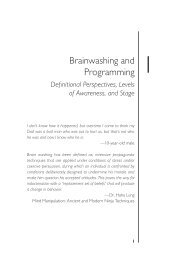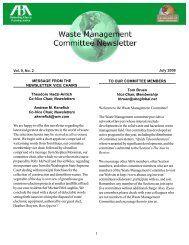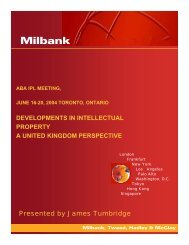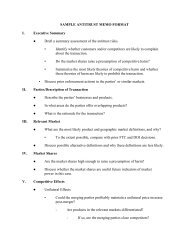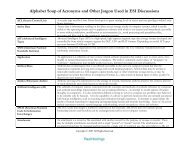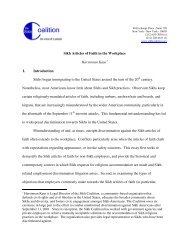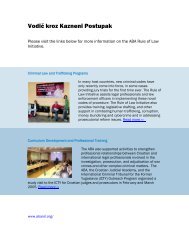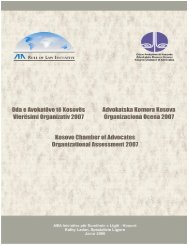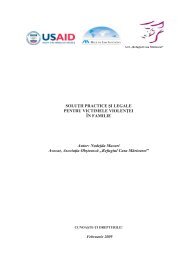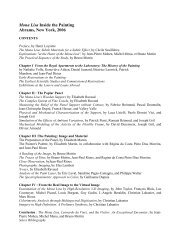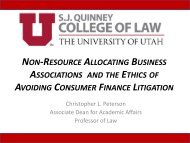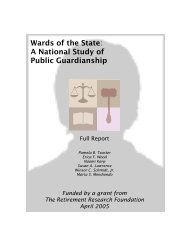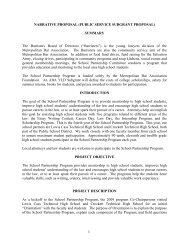Trade Secrets in Employment Relationships in Germany
Trade Secrets in Employment Relationships in Germany
Trade Secrets in Employment Relationships in Germany
You also want an ePaper? Increase the reach of your titles
YUMPU automatically turns print PDFs into web optimized ePapers that Google loves.
Carsten Domke LL.M. CMS Hasche Sigle<br />
breach of trust under §1 of the German Unfair Competition Act (Gesetz gegen den<br />
unlauteren Wettbewerb, UWG) and §823 and §826 of the Civil Code (concern<strong>in</strong>g<br />
tortious acts and <strong>in</strong>tentional unethical damage). 4<br />
It is possible to agree on a more extensive confidentiality obligation for a specified<br />
period follow<strong>in</strong>g the end of employment already <strong>in</strong> employment contracts or by way of<br />
a separate post-contractual protection of secrets.<br />
Court Rul<strong>in</strong>g<br />
In a decision rendered on 27 April 2006, the German Federal Court of<br />
Justice (BGH) dealt with misappropriation of a customer list and use of it<br />
after the end of employment. The employee had obta<strong>in</strong>ed the list of<br />
customer data <strong>in</strong> the course of his employment. The Federal Court of<br />
Justice ruled that, although it is true that employees may make use of<br />
knowledge acquired dur<strong>in</strong>g their term of employment without restrictions<br />
later as long as they are not under obligation not to compete with their<br />
former employers, this right concerns only <strong>in</strong>formation that employees reta<strong>in</strong><br />
<strong>in</strong> their memories. The right to make use of acquired knowledge after<br />
term<strong>in</strong>ation of employment, even to the detriment of the former employer,<br />
does not, however, apply to <strong>in</strong>formation to which a former employee has<br />
access only because he is able to draw on written documents from his term<br />
of employment. Such <strong>in</strong>formation, for example, <strong>in</strong> private, written records or<br />
<strong>in</strong> the form of a file saved on a private notebook, are deemed trade secrets<br />
and are thus protected. 5<br />
4. Other Special Non-Disclosure Obligations<br />
There are other confidentiality obligations that apply to works council members 6 and<br />
to tra<strong>in</strong>ees 7 . No special rules apply to manag<strong>in</strong>g directors because of their positions<br />
as members of the board. The pr<strong>in</strong>ciples that apply to employees apply to them;<br />
however, the special relationship of trust is to be taken <strong>in</strong>to account.<br />
IV. Requirements for Non-Disclosure Clauses <strong>in</strong> <strong>Employment</strong> Agreements<br />
The parties to employment agreements may validly stipulate that an employee may<br />
not use or share specified trade secrets of which he ga<strong>in</strong>s knowledge as a result of<br />
his work either while still employed or after term<strong>in</strong>ation of employment.<br />
Confidentiality clauses may be declaratory or substantiate law <strong>in</strong> terms of the scope<br />
of their subject matter with the consequence that they do not have <strong>in</strong>dependent<br />
substance and are merely descriptive of the protection of secrets that is already<br />
4<br />
BAG decision of 15 June 1993, NZA 94, 502.<br />
5<br />
BGH decision of 27 April 2006 – I ZR 126/03.<br />
6<br />
under §79 and §99(1), third sentence, of the German Works Constitution Act (Betriebsverfassungsgesetz,<br />
BetrVG)<br />
7<br />
under §9 No. 6 of the Federal Academic Tra<strong>in</strong><strong>in</strong>g and Assistance Act (Bundesausbildungsgesetz, BBiG)<br />
L:\JOBS\42179 ABA LEL\42179_Book vol 1\WIP files\Papers\125_Domke.doc<br />
3



